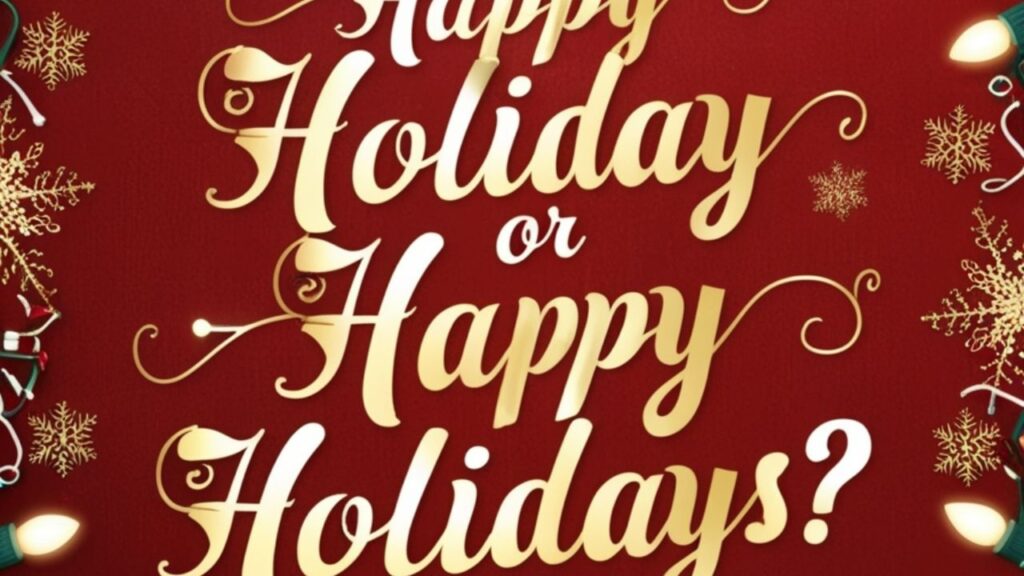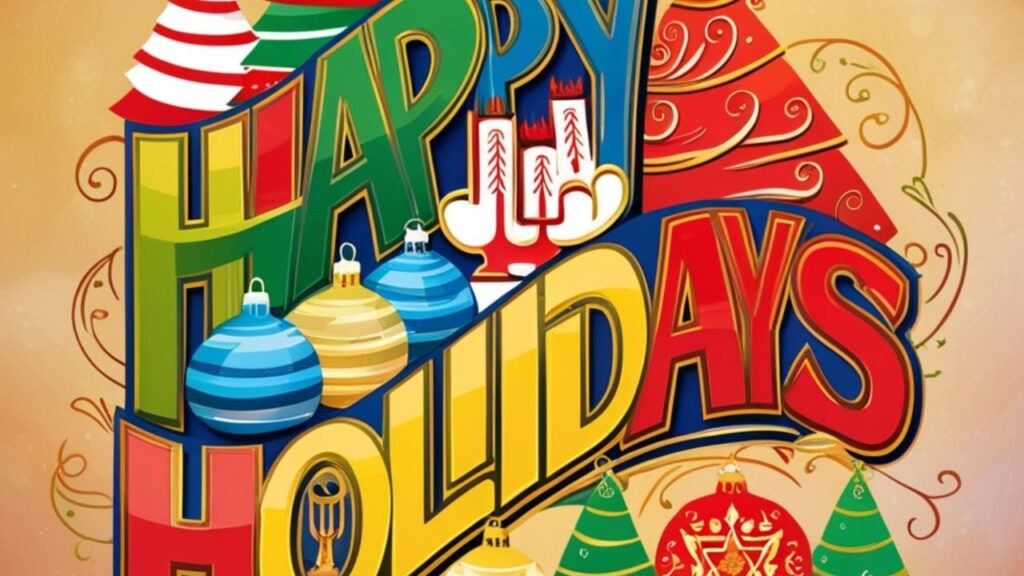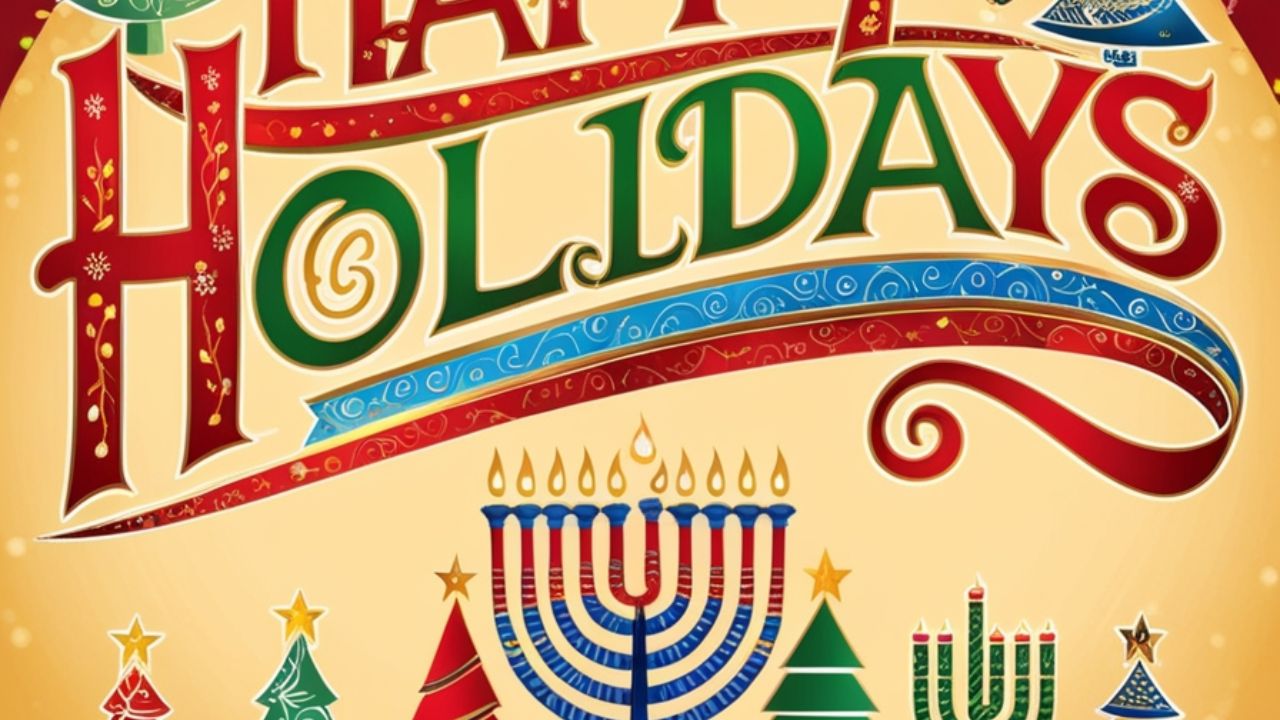The greeting Happy Holiday or Happy Holidays has two different uses. The single word “holiday” points to one special day like Christmas or Eid. The plural form “holidays” includes many events together, covering festivals and celebrations that happen during the same season.
In many countries, people prefer Happy Holidays because it feels welcoming to everyone. It respects all traditions happening in December like Christmas, Hanukkah, Kwanzaa, and New Year. The plural greeting creates a friendly tone and includes more than one special day.
The phrase Happy Holiday is also used in British English to mean “enjoy your vacation.” This use is common when someone is traveling or taking time off. It feels more personal and is different from the American style of greeting.
Understanding “Holiday” and “Holidays” in American Cultural Context
In the United States, the word Holiday often means one special celebration such as Christmas or Thanksgiving. People use it when talking about a single event. It gives attention to one day and marks it as an important occasion in the year.
The word Holidays means many celebrations happening during the same season. This includes Christmas, Hanukkah, Kwanzaa, and New Year’s. It is often used in schools, offices, and shops because it feels welcoming, warm, and respectful to people of different backgrounds.
- In the United States, Holiday often means one special day such as Christmas or Thanksgiving. It focuses on a single celebration.
- The word Holidays refers to the whole festive season, including Christmas, Hanukkah, Kwanzaa, and New Year’s.
- Using Holidays is common in schools, workplaces, and shops because it feels warm, respectful, and inclusive for people of different traditions.
The Singular “Holiday”: Usage and Definition
- The word Holiday is used when talking about one event, like Christmas or Hanukkah. It highlights only a single celebration.
- In American English, saying Happy Holiday is less common, as people often prefer the plural form.
- In British English, Holiday can also mean “vacation,” making the greeting sound different from the American style.
Examples:
- In the UK, people often say, “Enjoy your holiday,” when someone is traveling or resting.
- In the US, many prefer, “Enjoy your vacation,” instead of using the word holiday.
- A formal greeting might sound like, “Have a Happy Holiday, Mr. Johnson,” when you know the exact event.
Celebrating the Season: The Plural “Happy Holidays” in American English

“Happy Holidays” has become the go-to phrase in the U.S. Why? Because it includes multiple celebrations.
What it includes:
The phrase Happy Holidays includes many celebrations that happen close together. These are Christmas, Hanukkah, Kwanzaa, and New Year’s Day. People use the plural form so everyone can feel included during this special season of joy and togetherness.
Shops, schools, and workplaces often use Happy Holidays because it respects all traditions. It creates a friendly feeling for families, friends, and communities. This way, the greeting becomes a warm message that brings people together instead of focusing on only one celebration.
- Christmas celebrated on December 25 with lights, gifts, and family gatherings.
- Hanukkah, the Jewish Festival of Lights, lasting eight days in December.
- Kwanzaa, honoring African heritage from December 26 to January 1.
- New Year’s Day on January 1, welcoming fresh beginnings.
- Other cultural or community celebrations that take place during the winter season.
See also : Oeuvre Meaning and Usage in English Explained Clearly
Why “Happy Holidays” Is More Than a Simple Greeting
The phrase Happy Holidays carries more than cheerful words. It shows respect for many beliefs and traditions. People from different backgrounds feel welcomed and valued when this greeting is used, as it brings everyone together in one warm expression of kindness.
Using Happy Holidays also creates a sense of unity. Schools, companies, and communities choose it because it feels professional yet friendly. This greeting becomes a sign of care, acceptance, and harmony during a season filled with different celebrations.
- Respect – It shows care for many traditions and beliefs at the same time.
- Unity – It brings people together during a season filled with celebrations.
- Professionalism – It works well in schools, offices, and public spaces.
- Warmth – It creates a friendly and welcoming feeling for everyone.
- Inclusion – It makes all communities feel valued and represented.
The Inclusive Spirit Behind “Happy Holidays”
Why it matters in multicultural societies:
- Respect for diversity – It honors many cultures and traditions at the same time.
- Social harmony – It helps people feel included and valued in shared spaces.
- Positive communication – It builds unity through a simple and thoughtful greeting.
| Retailer | Message Shift | Year |
| Starbucks | “Merry Christmas” → “Happy Holidays” | 1990s |
| Walgreens | “Holiday Sale” | 2014 |
| Hallmark Cards | More inclusive card lines | 2000s |
How Grammar Influences Your Holiday Greetings
- Adding S to holiday changes the meaning from one event to many celebrations.
- The plural form Holidays makes the greeting sound broader and more inclusive.
- Small grammar shifts, like singular vs. plural, can shape tone and message.
Parallel comparisons:
- Good time means one moment, while good times shows many happy moments.
- Moment is a single point, but moments refers to several experiences.
- Holiday marks one event, while holidays includes a full season of celebrations.
Happy Holiday in Sentences: When to Use This Less Common Variant
- Use Happy Holiday when you know the exact celebration someone is enjoying, like Hanukkah or Christmas.
- It works well in formal greetings, such as letters or cards written for one event.
- In British English, Holiday often means vacation, so the phrase can carry a different meaning.
Example:
- “Dear Mr. Patel, I hope you enjoy a Happy Holiday this December.”
- “Have a Happy Holiday and may your celebration be joyful.”
- “Wishing you a Happy Holiday filled with peace and happiness.”
See also : Receiver vs Reciever – Correct Spelling Explained
The Vacation Connotation of “Happy Holiday” in British English

- In the UK, Happy Holiday often means “enjoy your vacation,” not a festival greeting.
- People use it when someone is traveling for rest, study, or leisure abroad.
- Around Christmas, British speakers usually prefer Merry Christmas or Happy Christmas instead of the plural form.
Final Thoughts
The choice between Happy Holiday or Happy Holidays may look small, but it holds real meaning. One form is personal and direct, while the other is inclusive and respectful. Both show care when used with kindness during the festive season.
In today’s world, the greeting Happy Holidays feels more welcoming in schools, offices, and public places. It respects many cultures together and spreads harmony. Using such words creates stronger connections and brings people closer during a joyful time of year.
FAQs
What Is the Correct Way to Write “Happy Holiday”?
The correct way is Happy Holidays with both words capitalized, as it respectfully covers multiple festive days celebrated during the season.
Is It OK to Say Happy Holidays?
Yes, it is polite and inclusive. Happy Holidays respects different traditions and cultures, making it a friendly greeting for everyone during festive times.
Do We Say Holiday or Holidays?
We usually say Holidays because the season includes many celebrations. Using the plural form makes the greeting broader, warmer, and more respectful to traditions.
How Do You Say “Have a Happy Holiday”?
You can say Have a Happy Holiday when wishing someone joy for a specific day, but Happy Holidays is more common for the season.

Join Bibcia on a journey to master English grammar. Discover easy lessons, writing tips, and practical examples designed to make learning grammar simple and effective.










